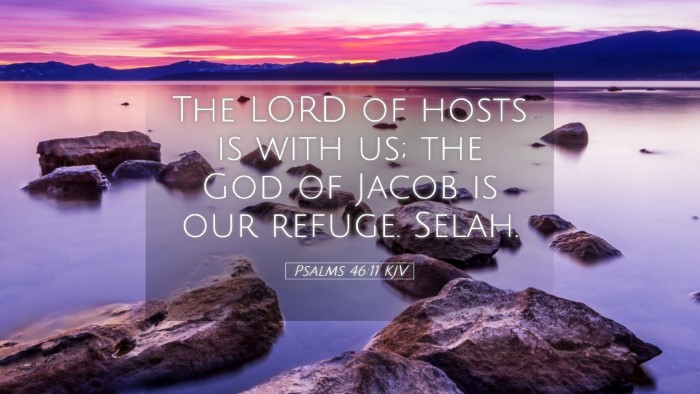Psalms 46:11 Commentary
Verse Text: "The LORD of hosts is with us; the God of Jacob is our refuge."
Introduction
Psalms 46 is a powerful declaration of God's omnipresence and strength, offering profound comfort to believers, especially in times of trouble. Verse 11 serves as a climactic affirmation of God’s constant support and security for His people. This summary commentary will draw insights from various public domain sources including Matthew Henry, Albert Barnes, and Adam Clarke, providing a comprehensive examination of this vital verse.
Historical Context
The Psalms were often composed during times of turmoil and distress, reflecting the collective experience of the people of Israel. Psalm 46 is believed to have been written during a period of crisis, possibly in response to the Assyrian threat against Jerusalem. The reference to “the God of Jacob” emphasizes the covenant relationship between God and His people, particularly underscoring His faithfulness throughout generations.
Key Themes
- Divine Presence: The phrase “The LORD of hosts” affirms that God is not only present but actively engaged in the affairs of His people.
- Security and Refuge: The assurance that “the God of Jacob is our refuge” highlights God as a sanctuary in times of distress.
- Faithfulness of God: The reference to Jacob invokes the many covenants God made, representing His enduring faithfulness.
Commentary Insights
Matthew Henry
Matthew Henry emphasizes the comfort that comes from the recognition that God is “with us.” In the face of adversity, this assurance strengthens faith. Henry notes that God, as the "LORD of hosts," commands the heavenly armies and is fully capable of protecting His people. The reference to Jacob also serves as a reminder of the personal nature of God’s promises, suggesting that His protective presence is both corporate and individual.
Albert Barnes
Albert Barnes points out that the title “God of Jacob” reminds the faithful of God’s historical dealings with His people, assuring them of His reliability. Barnes explains that God's presence in their midst gives them courage in the face of any trial. He notes that the Psalmist's confidence lies not in human strength but in divine power, making the phrase a declaration of trust in God's sovereign authority.
Adam Clarke
Adam Clarke elaborates on the metaphor of God as a “refuge,” suggesting that this implies safety, peace, and protection. Clarke argues that recognizing God as our refuge means drawing near to Him, thereby finding solace amid chaos. He further interprets “the LORD of hosts” as a declaration of God’s supreme authority over all celestial and earthly powers, reminding believers that their battles are fought under the auspices of a God who is all-powerful.
Theological Implications
- Omnipresence of God: This verse affirms the belief that God is always present, particularly in the midst of struggles and trials.
- Covenant Relationship: The mention of Jacob signifies a historical relationship with God, encouraging believers to trust in His steadfastness.
- Peace Amid Turmoil: Understanding God as a refuge allows believers to find peace despite external chaos, fostering a deep-rooted faith.
Practical Applications
Pastors and leaders can draw on this verse to comfort and encourage congregations facing difficulties. The emphasis on God as refuge underscores the necessity of encouraging individuals to rely on God's presence rather than their circumstances. Moreover, students and scholars can reflect on the theological implications of God's faithfulness as it relates to contemporary faith challenges.
Conclusion
Psalms 46:11 stands as a profound reminder of God's unwavering presence and strength. Through the insights of Matthew Henry, Albert Barnes, and Adam Clarke, believers are encouraged to find refuge in the Lord, assuring them that no matter the trials they face, they are never alone. This verse encapsulates the essence of faith: trusting in the steadfast presence and protection of God in every season of life.


